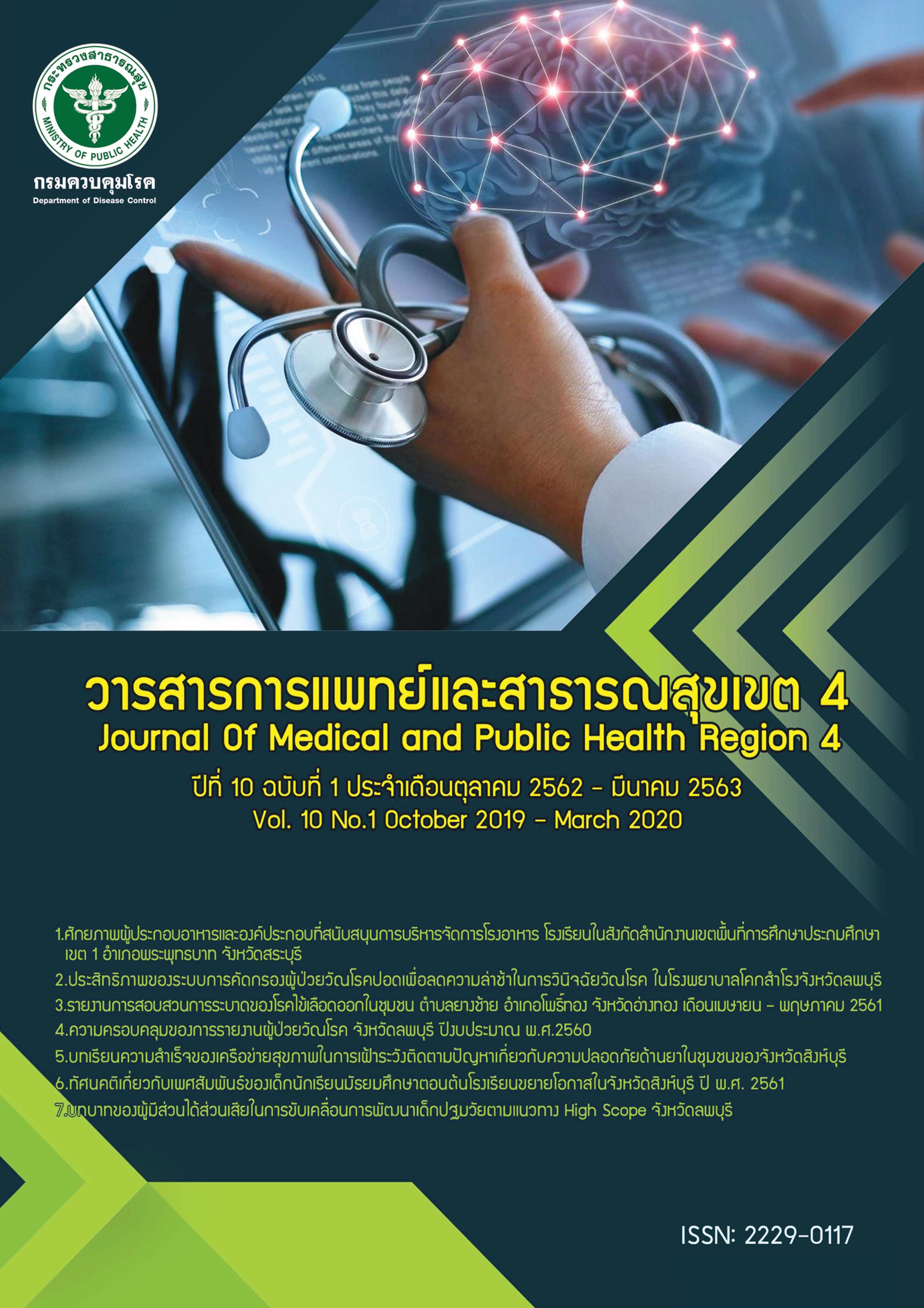Lessons Learned from the Success of Health Network for community drug safety surveillance in Singburi Province
Main Article Content
Abstract
The Purposes of this qualitative research were; 1) The lesson learned for the conditions that to be success with using health network to manage drug safety problems; and 2) to study the outcomes through attitude, knowledge and behavior related to use contaminated steroids product among population in Sing Buri province. This research was collected the data by interview to executives (district health officers and hospital directors from 6 districts) and focus group to 24 district officers and hospital pharmacists and also collected using questionnaire and interview 505 elderly from 6 districts. This qualitative data was used thematic analysis, and quantitative data was used descriptive statistics. The result revealed that; 1. The conditions that to be success in executive perspectives have 6 main points; as follows, 1) obvious policy from every level of executives 2) there are guidelines to operate and monitor 3) have working groups entire organization and community 4) coverage efficient data 5) building health literacy and 6) awareness to self-care. Moreover, in local officer perspectives have 5 main points; as follows, 1) building learning with community health network by story-telling from community 2) community should have consensus agreement to monitor the operation 3) collaboration of multidisciplinary team in home visiting and health promoting 4) meeting of board committee continuously and 5) have good coordinator. 2. The outcomes of the operation found that the elders have knowledge about steroid; recognized about steroid with 70%, recognized that the doctors who can prescribe with 79.17%, recognized term of steroid use with 51.10%, recognized the harm of use contaminated steroid product that cause kidney failure with 34.91%. Furthermore, the elders have very good attitudes toward good health product with mean 11.22 and SD 2.44 The elders have very good behaviors in use health products with mean 17.05 and SD 1.39 The recommend of this study, public health officers should concern about the conditions that to be success in operations; such as services, participation of health network, monitoring and supporting the budget for successful operation.
Article Details
References
2. Holloway K, Dijk LV. The World Medicines Situation 2011 (Rational Use of Medicines)
Geneva: World Health Organization; 2011.
3. สุภนัย ประเสริฐสุข, กนกพร ธัญมณีสิน และเชิดชัย อริยานุชิตกุล. สถานการณ์การเลื่อนไหลและกลไกการจัดการปัญหาสเตียรอยด์ในระดับต้นน้ำ. วารสารเภสัชศาสตร์อีสาน; 11 (ฉบับพิเศษ) 2559ว: 245-259.
4. ภาณุโชติ ทองยัง. อย่าปล่อยให้สเตียรอยด์ลอยนวล: เรื่องราวการเฝ้าระวังยาไม่ปลอดภัยในชุมชน. แผนงานสร้างกลไกเฝ้าระวังและพัฒนาระบบยา (กพย.). คณะเภสัชศาสตร์ จุฬาลงกรณ์มหาวิทยาลัย; 2554.
5. เด่นชัย ดอกพอง. (2555). การประเมินผลโครงการ การจัดการสเตียรอยด์โดยเครือข่ายชุมชนตำบลศรีตระกูล อำเภอขุขันธ์ จังหวัดศรีสะเกษ. วารสารวิชาการสาธารณสุข 2555; 19: 845-853.
6. สำนักงานสาธารณสุขจังหวัดสิงห์บุรี. สรุปผลการดำเนินงานของสำนักงานสาธารณสุขจังหวัดสิงห์บุรี
ประจำปี 2562. จังหวัดสิงห์บุรี; 2561.
7. สำนักงานคณะกรรมการอาหารและยา. คู่มือการเก็บรวบรวมข้อมูลการใช้ยาปลอดภัยในชุมชน. กรุงเทพฯ; 2561.
8. เทพศักดิ์ อังคณาวิศัลย์ และผณินชิสา สุสิกะไชย. การถอดบทเรียนจากโครงการจัดการความปลอดภัยด้านยาในชุมชนโดยการมีส่วนร่วมของภาคีเครือข่ายในจังหวัดพระนครศรีอยุธยาระหว่างปี 2558-2560.วารสารเภสัชกรรมไทย 2561;10: 145-159.
9. Braun, V. and Clarke, V. Using Thematic Analysis in Psychology. Qualitative Research in Psychology 2006; 3: 77-101.
10. Kania J, Kramer M. Collective impact. Stanford Social Innovation Review 2011; 9: 36-41.
11.วราพร เขียวงามและอาจินต์ สงทับ.(2562).ผลกระทบจากการใช้ยาชุดแก้ปวดที่ปนเปื้อนสารสเตียรอยด์ที่ไม่เป็นไปตามข้อบ่งชี้ทางการแพทย์ . วารสารวิชาการมหาวิทยาลัยอีสเทิร์นเอเชีย 2562; 13: 27-37.


